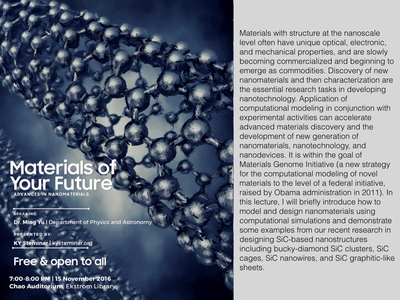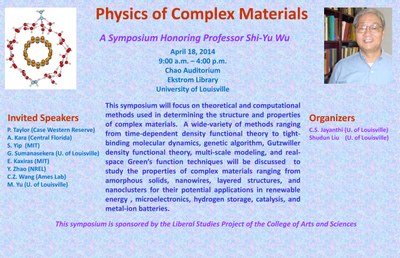Special Events
Materials of Your Future - Advances in Nanomaterials
| When |
Nov 15, 2016 07:00 PM
to
Nov 16, 2016 08:00 PM |
|---|---|
| Where | Chao Auditorium, Ekstrom Library - Louisville, KY |
| Add event to calendar |
|
Speaker: Ming Yu, Department of Physics & Astronomy, University of Louisville
Abstract: Materials with structure at the nanoscale level often have unique optical, electronic, and mechanical properties, and are slowly becoming commercialized  and beginning to emerge as commodities. Discovery of new nanomaterials and then characterization are the essential research tasks in developing nanotechnology. Application of computational modeling in conjunction with experimental activities can accelerate advanced materials discovery and the development of new generation of nanomaterials, nanotechnology, and nanodevices. It is within the goal of Materials Genome Initiative (a new strategy for the computational modeling of novel materials to the level of a federal initiative, raised by Obama administration in 2011 ). In this lecture, I will briefly introduce how to model and design nanomaterials using computational simulations and demonstrate some examples from our recent research in designing SiC-based nanostructures including bucky-diamond SiC clusters, SiC cages, SiC nanowires, and SiC graphitic-like sheets.
and beginning to emerge as commodities. Discovery of new nanomaterials and then characterization are the essential research tasks in developing nanotechnology. Application of computational modeling in conjunction with experimental activities can accelerate advanced materials discovery and the development of new generation of nanomaterials, nanotechnology, and nanodevices. It is within the goal of Materials Genome Initiative (a new strategy for the computational modeling of novel materials to the level of a federal initiative, raised by Obama administration in 2011 ). In this lecture, I will briefly introduce how to model and design nanomaterials using computational simulations and demonstrate some examples from our recent research in designing SiC-based nanostructures including bucky-diamond SiC clusters, SiC cages, SiC nanowires, and SiC graphitic-like sheets.
A SYMPOSIUM ON “PHYSICS OF COMPLEX MATERIALS” - A Symposium Honoring Professor Shi-Yu Wu
| When |
Apr 18, 2014
from 09:30 AM to 04:00 PM |
|---|---|
| Where | Chao Auditorium, Ekstrom Library - Louisville, KY |
| Add event to calendar |
|
Invited Speakers:
P. Taylor ( Case Western Reserve} A. Kara (Central Florida}
S. Yip (MIT}
G. Sumanasekera (U. of Louisville} E. Kaxiras (MIT}
Y. Zhao (NREL}
C.Z. Wang (Ames Lab}
M. Yu (U. of Louisville}
Organizers:
C.S. Jayanthi (U. of Louisville}
Shudun Liu (U. of Louisville}
 Abstract: This symposium will focus on theoretical and computational methods used in determining the structure and properties of complex materials. A wide-variety of methods ranging from time-dependent density functional theory to tightbinding molecular dynamics, genetic algorithm, Gutzwiller density functional theory, multi-scale modeling, and realspace Green's function techniques will be discussed to study the properties of complex materials ranging from amorphous solids, nanowires, layered structures, and nanoclusters for their potential applications in renewable energy , microelectronics, hydrogen storage, catalysis, and metal-ion batteries.
Abstract: This symposium will focus on theoretical and computational methods used in determining the structure and properties of complex materials. A wide-variety of methods ranging from time-dependent density functional theory to tightbinding molecular dynamics, genetic algorithm, Gutzwiller density functional theory, multi-scale modeling, and realspace Green's function techniques will be discussed to study the properties of complex materials ranging from amorphous solids, nanowires, layered structures, and nanoclusters for their potential applications in renewable energy , microelectronics, hydrogen storage, catalysis, and metal-ion batteries.
